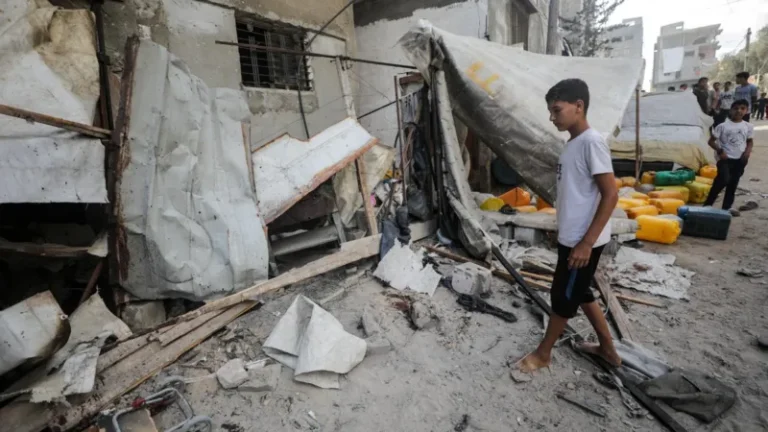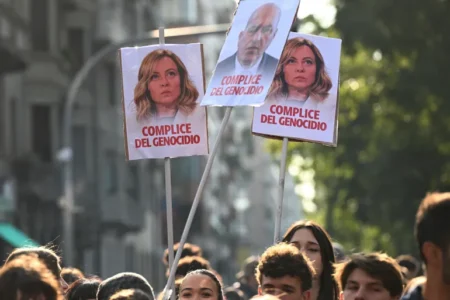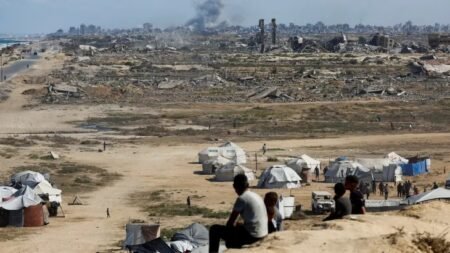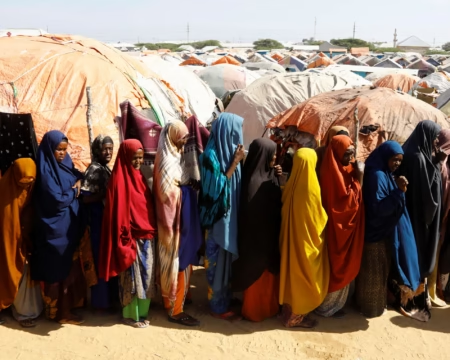Mahmoud Abdul Rahman Ahmed lost his son, Abdullah, during a recent airstrike in central Gaza. The boy had gone to collect water from a public distribution point in the urban area of Nuseirat. Like many others in the war-torn region, he carried the family’s yellow jerrycans, hoping to bring home enough water to survive the day.
That morning, many displaced residents stood in line, waiting for water. Mahmoud described the scene: hungry children with dry lips and empty containers, standing in hope under the harsh sun. But their hope turned to horror when warplanes struck the area without warning.
A local journalist filmed the aftermath. The video, later confirmed by international media, showed chaos. Bodies, mostly children, lay lifeless on the ground. Yellow plastic jerrycans were scattered near a destroyed building. People screamed and tried to rescue the injured from the rubble. Blood covered the street.
Ten people died in the airstrike, including six children. Al-Awda hospital confirmed the deaths and said 16 others were injured. The young victims included Abdullah, Badr al-Din Qaraman, Siraj Khaled Ibrahim, Ibrahim Ashraf Abu Urayban, Karam Ashraf al-Ghussein, and Lana Ashraf al-Ghussein.
When questioned, the Israeli military said it was targeting a member of Palestinian Islamic Jihad. However, they admitted that the strike missed its mark due to a technical error. The bomb reportedly fell dozens of meters away from its intended target. The military expressed regret for civilian harm and stated that an investigation was underway.
Mahmoud, like many others, does not believe it was a simple mistake. He says it felt like a message: even the basic right to water was being denied. His grief echoes across Gaza, where many families are now burying their children.
“They had dreams,” Mahmoud said. “They wanted to grow, play, travel, and live safely, like children everywhere.”
Water has become dangerously scarce in Gaza. According to the UN, fuel and spare part shortages have crippled water systems, including desalination and pumping stations. Israeli military actions have further restricted access, creating what the UN calls a “human-made drought crisis.”
Most residents now get less than 15 liters of water per person each day. That’s below the emergency standard for survival. Families rely on trucks to deliver water. Each morning, long lines of children appear beside roads with plastic containers, hoping to collect enough water to clean, cook, and drink.
Sam Rose, the acting Gaza director for the UN agency supporting Palestinian refugees, called the strike “emblematic” of the crisis. “Every death is a tragedy,” he said. “This one stands out because of the setting, but it is one of many.”
Just days earlier, another strike killed ten children and three women outside a clinic in nearby Deir al-Balah. They had gathered for nutritional support. As in the Nuseirat case, the Israeli military said it had targeted a Hamas member and regretted civilian harm.
UNICEF Executive Director Catherine Russell condemned both attacks and urged Israel to review its military rules. She demanded respect for international humanitarian law and protection for civilians, especially children.
The UN Security Council is expected to meet later this week to discuss the impact of the conflict on Gaza’s children. The meeting follows a formal request by the UK.
Still, Israeli officials have blamed Hamas, saying the group uses civilians as shields. Israeli representative Danny Danon argued that the real responsibility lies with Hamas, not Israel.
For families like Mahmoud’s, such claims offer no comfort. “We are civilians,” he said. “We don’t have weapons. We are not a threat. This war must end.”
His voice joins many others calling for peace. They want an end not just to the bombs but to the fear, hunger, and thirst that define daily life in Gaza.







